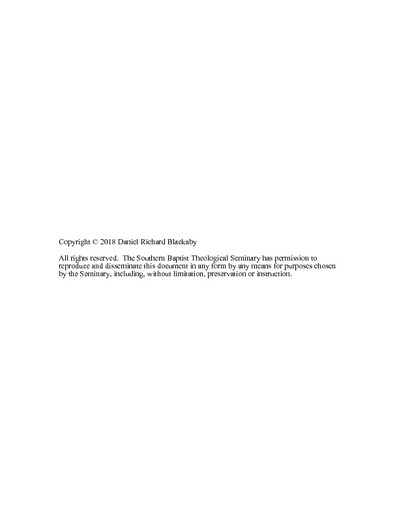| dc.description.abstract | ABSTRACT
AN ARGUMENT FROM SUBLIME LITERATURE: HOW
LANGUAGE, BEAUTY, AND LITERATURE POINT TOWARD THE EXISTENCE OF GOD
Daniel Richard Blackaby, Ph.D.
The Southern Baptist Theological Seminary, 2018
Chair: Dr. Mark T. Coppenger
The thesis of this dissertation is that there is no feasible pathway from Darwinian evolution to the creation of mankind’s great literature. Conversely, the Christian worldview and biblical theology offer a far more satisfying and coherent answer by providing a foundation for the creation of sublime literature precisely where Darwinism falls apart. The argument unfolds in two stages. The first provides a critique of the Darwinian explanation for literature. The goal is to level the playing field, push back against the stranglehold evolutionists have held on the subject, and expose the need to reconsider alternative solutions. The argument—that there is no clear path from Darwinian evolution to man’s great achievement of sublime literature—is approached as a cumulative case argument. Darwinism cannot account for the existence of sublime literature because it cannot sufficiently account for any of the three major aspects of great literature—aesthetics, language, and literary meaning. The second stage makes a case that the Christian worldview and biblical theology provide a better, more consistent, and accurate explanation for the phenomenon. The argument in the second stage presents the Christian worldview’s explanation for each of the three major aspects of great literature, and then demonstrate how the explanations are supported by the current research in aesthetic philosophy, linguistics, and literary criticism.
Chapter 2 provides a brief discussion on and definition of literature. Chapter 3 examines the question of the origin of language by providing a brief survey and critique of the major historical and modern theories given out of a naturalistic worldview. Chapter 4 examines the aesthetic problem by demonstrating the shortcomings of the major Darwinian theories regarding beauty and aesthetics. Chapter 5 deals with the topic of literary meaning by examining a collection of issues are discussed, including a critique of Literary Darwinism, as well as the materialist problem of consciousness. Chapter 6 provides an argument for the Christian worldview as a more viable account for literature, by demonstrating its superior explanatory power in each of the areas where the Darwinian account falls short. | en_US |

